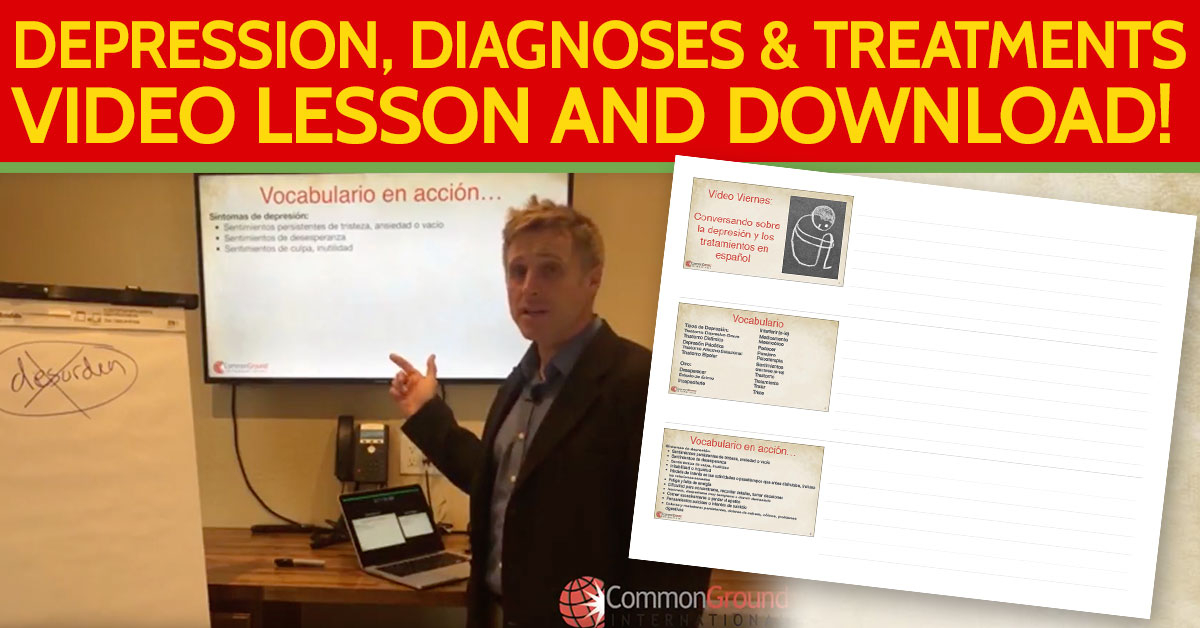This is Lesson 2 of 5 in our Mental Health in Spanish series.
In this free Medical Spanish lesson, you will learn how to talk about anxiety in Spanish with your patients: Hablar sobre la ansiedad.
In this lesson about discussing anxiety in Spanish we’re looking at:
- Tipos de ansiedad / Types of anxiety
- Síntomas de la ansiedad y vocabulario relacionado / Symptoms of anxiety and related vocabulary
- Unas preguntas sobre síntomas / A few questions about symptoms
- Diagnóstico / Diagnosis
- Causas de la ansiedad / Causes of anxiety
- Fobias / Phobias
- Medicamentos / Medicines
- Terapias / Therapies
- Prácticas diarias para reducir el estrés / Daily practices to reduce stress
- Acrónimos para enfocar la atención y aliviar ansiedad / Acronyms to focus attention and relieve anxiety
Here is the Discussing Anxiety in Spanish lesson that I taught on YouTube and to our Facebook group:
Subscribe to our YouTube Channel to see all of our lessons and get the latest videos right away!
Tipos de ansiedad – Types of Anxiety
Let’s start the lesson by talking about the different types of anxiety a patient may experience:
- Ansiedad por una condición médica / Anxiety due to a medical condition
- Ansiedad por separación / Anxiety due to a separation
- Ansiedad por sustancias / Substance anxiety
- Trastorno de ansiedad generalizada / Generalized Anxiety Disorder
- Trastorno de pánico / panic disorder
- Fobias (agorafobia, fobia social, otras) / Phobias (agoraphobia, social phobia, others)
Síntomas de la ansiedad – Symptoms of Anxiety
| Spanish | English |
| Ansiedad / Ansios@ | Anxiety / Anxious |
| Miedo | Fear |
| Nervios / nervios@ | Nerves / nervous |
| Palpitaciones / frecuencia cardíaca elevada | Palpitations / elevated heart rate |
| Problemas gastrointestinales | Gastrointestinal troubles |
| Respiraciones rápidas | Fast breathing |
| Sentirse inquiet@ | Feeling restless |
| Sudores | Sweatings |
| Temblores | tremors |
| Triste / Tristeza | Sad / Sadness |
| Dificultad para: | Difficulty (doing something): |
| • Controlar las preocupaciones | • Controlling your concerns |
| • Concentrarse | • Concentrating |
| • Pensar en otras cosas | • Thinking about other things |
| • Dormir / dormirse | • Sleeping |
Otro Vocabulario relacionado con la ansiedad en español – Other related vocabulary with anxiety in Spanish
Verbos
- Comportarse / Portarse – To behave
- Desaparecer – To disappear
- Evitar situaciones – To avoid situations
- Interferir (e-ie) – To interfere
- Padecer – To suffer
- Preocuparse – To worry
- Sentirse (e-ie) – To feel
- Tratar – To treat / To try
Otro:
- Estado de ánimo – Mood
- Demasiado / Excesivo – Too much /Excessive
- Medicamento – Medication
- Pensamientos – Thoughts
- Preocupaciones – Concerns, worries
- Psicoterapia – Psychotherapy
- Trastorno – Disorder
- Tratamiento – Treatment
Unas preguntas sobre síntomas… A Few Questions About Symptoms
- ¿Tiene sentimientos persistentes de tristeza, ansiedad o vacío? / Do you have persistent feelings of sadness, anxiety, or emptiness?
- ¿Se preocupa demasiado de: la salud, el trabajo, interacciones sociales, y la vida rutinaria? / Are you worrying too much about: your health, work, social interactions, and routine life?
- ¿Ha notado sentimientos de irritabilidad o inquietud? / Have you noticed feelings of irritability or restlessness?
- ¿Tiene fatiga y falta de energía? / Do you have fatigue and lack of energy?
- ¿Ha notado una dificultad para concentrarse, recordar detalles, tomar decisiones? / Have you noticed difficulty concentrating, remembering details, making decisions?
- ¿Siente tensión muscular? / Do you feel muscular tension?
- ¿Tiene dificultad para controlar sus preocupaciones? / Do you have difficulty controlling your concerns?
- ¿Le cuesta dormirse, dormir durante toda la noche y sueño insuficiente? / Is it difficult fall sleep, sleep all night long, and insufficient sleep?
Diagnóstico – Diagnosis

1. Trastorno de Ansiedad Generalizada – Generalized Anxiety Disorder
Cuando tiene preocupaciones o ansiedad la mayoría de los días por más de 6 meses. Este miedo le causa problemas en su vida social, trabajo, familia, etc.
When you have concerns or anxiety most days for more than 6 months. This fear causes you problems in your social life, work, family, etc.
2. Ataques de Pánico – Panic Attacks
Cuando tiene ataques de pánico recurrentes y repentinos. Son momentos inesperados de miedo intenso. Pueden ser provocados por situaciones u objetos temidos.
When you have recurring and sudden panic attacks. They are unexpected moments of intense fear. They may be caused by feared situations and objects.
3. Ansiedad por… – Anxiety due to…
- Condiciones médicas: Ansiedad o pánico intenso causado por una condición médica.
- Separación: Ansiedad en los niños (excesiva para su edad y desarrollo) al separarse de sus padres o tutores.
- Sustancias: Cuando el abuso de sustancias (tóxicas), medicamentos, o la abstinencia de las sustancias causa ansiedad o pánico intenso.
- Medical conditions: Anxiety or intense panic due to a medical condition
- Separation: Anxiety in children (excessive for their age and development) caused by separating them from their parents or guardians.
- Substances: When the abuse of (toxic) substances, medications, or withdrawal of substances causes anxiety or intense panic.
¡Gracias POR compartir su aventura de español conmigo!
Now it’s your turn! I packaged all of this vocabulary in Spanish into some flashcards for you to study.
Su tarea – Your Homework
- Review the notes & vocabulary
- Identify additional points and topics to discuss with patients
- Let me know if you need help 🙂
- Remember to keep it simple if you need to
- Ask for help in the comments below
- Give it a try with your patients!
Keep up the good work speaking responsible Spanish to your patients! Check out our other books, classes & products to help you learn medical Spanish!
*If the link isn’t working for you, you may need to unblock pop-ups in your browser settings
We want to know…Comment below–>What are your thoughts about this topic. Let us know in English or Spanish in the comment section below!
Other posts in this Mental Health series:
How to Evaluate Depression in Spanish using SIG E CAPS
This Medical Spanish lesson teaches you how to evaluate depression in Spanish using SIG E…
Questions and Phrases to Assess Child Abuse and Neglect in Spanish
This Medical Spanish lesson focuses on learning how assess child abuse and neglect in Spanish….
Mental health Conversation in Spanish – Listening Comprehension
Work on your listening comprehension in Spanish and learn about the mental health situation in…
How to Teach Coping Strategies in Spanish
Coping strategies in Spanish are “Estrategias de afrontamiento”. This week, as I was preparing to…
PHQ 9 and GAD 7 for depression and anxiety screenings in Spanish
Screening for depression and anxiety with the PHQ-9 and GAD-7 in Spanish. Do you ever…
Discussing ADD and ADHD in Spanish
ADD in Spanish is “TDA: el trastorno de déficit de atención” and ADHD is “TDAH:…
Discussing PTSD in Spanish
PTSD in Spanish PTSD is lesson 4 in our 5-lesson series on discussing mental health…
Discussing Substance Abuse in Spanish
In today’s lesson, we’re addressing topic #3 from the mental health survey that our community…
Discussing Depression in Spanish
This is Lesson 1 of 5 in our Mental Health in Spanish series. In this…
Mental Health Conversations in Spanish
In this free Medical Spanish lesson you will learn how to have Mental Health Conversations…
Explaining Depression Diagnoses & Treatments in Spanish
This Medical Spanish lesson focuses on explaining the depression diagnoses and treatments in Spanish to…















Anger Management in Spanish. I work with probation clients and anger management appears to be a theme and there are not a lot of Spanish Resources on Anger Management.
That’s a great idea Jessica, we’ll work on that!